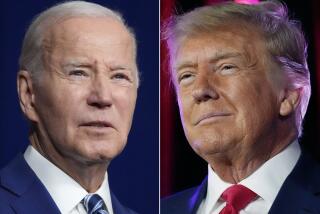Musharraf Risks All With Needless Vote
- Share via
GREAT FALLS, Va. — Pakistan’s fourth military dictator, Gen. Pervez Musharraf, has made a critical decision in his 30-month tenure: to jump into the murky, treacherous waters of Pakistani politics. That this decision was unnecessary, irrational and not in the country’s best interest is now irrelevant. By announcing that he will seek a five-year presidential term in a referendum later this month, Musharraf has not just put his head on the line, he has created a climate of uncertainty that should alarm the United States and its international allies.
The timing seems, at first, puzzling. While the U.S. and others have urged Musharraf to restore civilian democracy, in recent months this has become a more long-term goal. Musharraf has been embraced by world leaders and welcomed in major world capitals. Pakistan has been quietly removed from sanction lists, and the flow of international aid has increased dramatically. Domestically, a pliant judiciary and press have provided tacit support for Musharraf’s policies. And he had begun taking real steps toward something no one else could have even attempted: banning extremist religious organizations, curbing terror-spewing religious schools known as madrasas, purging (though half-heartedly) rogue intelligence networks and supporting a U.S.-led war against the Taliban.
So what has pushed him into the muddy world of politics? He is certainly ambitious. And in recent months he has become overconfident, intoxicated with power and his newfound respectability abroad. Finally, though, his decision came not so much because of what he wants for himself now, but rather with the role he wants to play on a much larger stage in October, when Pakistan will hold parliamentary elections. Musharraf is looking for a mandate today that will guarantee his handpicked candidates an advantage in those elections. He acknowledges he is taking a huge risk, but argues that as a military man he is not afraid to do so.
The problem is that the risk is not simply Musharraf’s--it is Pakistan’s. If he doesn’t get a convincing majority in an honest and open vote later this month, he faces a threat from the religious fundamentalists he has been trying to stifle as well as from an increasingly unruly military, which would view his defeat as an invitation to make trouble. Even a weak vote of support in a genuinely free and fair referendum would shake his political edifice. And a rigged vote would compromise his credentials abroad and, more importantly, weaken his grip on the core of his ruling junta, which is already pushing for the removal of Musharraf as chief of the army. Pakistan’s major political parties have spoken out against holding a referendum.
The multi-pronged and difficult war against international terrorism demands a Pakistani leader committed to identifying and pursuing the rogue armies of terrorists inside and outside Pakistan. Initially, Musharraf rose to the occasion, making strong and unequivocal statements and demonstrating his willingness to act. Not anymore. Since his thoughts have turned to the referendum, he has begun making compromises. He has released hundreds of arrested Taliban fighters and their Pakistani religious mentors. He has refused to hand Ahmad Saeed Omar Sheikh, the prime suspect in American journalist Daniel Pearl’s murder. He is now breaking bread with the same corrupt politicians against whom he once waged a sincere accountability campaign. Lastly, he is cracking down on Pakistan’s tiny but independent print media while blatantly using the tightly controlled electronic media for his aggressive political campaigning. In short, from an honest military strongman on solid moral ground, Musharraf has become a double-speaking dictator-politician, making fervent, broadly emotional and mostly hollow appeals for public support.
Washington should be very afraid. The U.S. is pumping hundreds of millions of taxpayer dollars into Pakistan. It was perhaps wrong in the first place for Washington to count so much on one man. Now, in a time of such uncertainty, it becomes crucial that the U.S. reach out to other potential leaders, developing direct rapport with top military generals and supporting relatively clean and popular politicians. The U.S. should encourage the judiciary to act independently, particularly on issues involving popular but exiled political leaders. And the U.S. should support a vigorous free press.
If Musharraf is choosing now to be a politician, he must be pressured to level the playing field for other Pakistani politicians before the October elections. As Pakistan has witnessed repeatedly, attempts to use brute military and state force to further the half-baked political agendas of military dictators have always pushed the country into instability and chaos. And in today’s climate, such a situation would serve the ends of terrorists and rogue armies.
The best option for the West would be to ask Musharraf not to demolish himself so soon for so little. He should call off the referendum now. He has been given another three years of legitimate rule by the Supreme Court, and he could seek, and likely receive, a two-year extension. That would give Musharraf time to oversee free and fair parliamentary elections as scheduled and to grant the judiciary the independence and responsibility to decide corruption cases against politicians and generals. It would give him time to find a new army chief and give up that part of his job in order to distance the military from politics. Once things are stable, Musharraf should resign as president and seek election through constitutional means.
More to Read
Sign up for Essential California
The most important California stories and recommendations in your inbox every morning.
You may occasionally receive promotional content from the Los Angeles Times.













